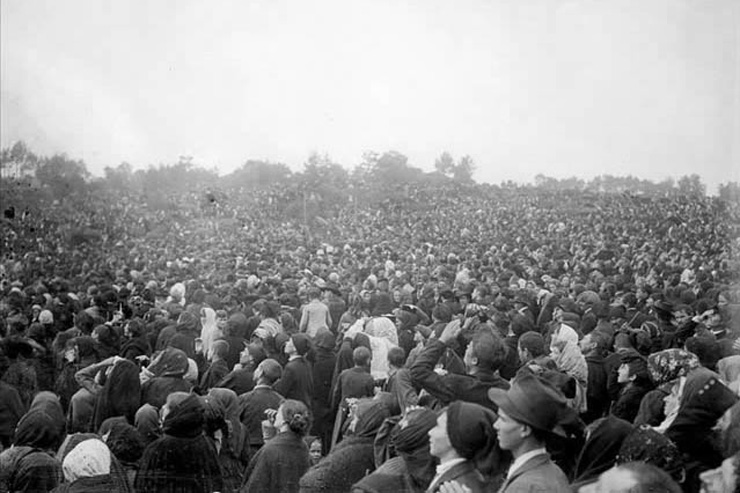In this season of preparation for the arrival of Easter, there is one particular practice that seems to get a lot of attention, most of it negative. This should not be surprising since the practice is all about denying ourselves something we have all become quite accustomed to – food. The practice of course is fasting.
“But he said to them, ‘I have food to eat of which you do not know.’” (John 4:32)
This particular verse, from the early days of Jesus’ public ministry, reveals one of the sources of Jesus’ power and His intimate connection with God the Father. Jesus wants to make clear to His disciples that there is something much more important in this life than even the consumption of food.
“Jesus said to them, ‘My food is to do the will of him who sent me, and to accomplish his work.’” (John 4:34)
If there is something more important than even earthly food, we certainly all want to know what that is. And of course, we all want to make sure we acquire enough of it to maintain our lives and our health, and most especially, our spiritual well-being. Again, Jesus makes it clear to us in His own words what is required for good nutrition, including a healthy spiritual diet.
“It is written, ‘Man shall not live by bread alone, but by every word that proceeds from the mouth of God.’” (Matthew 4:4)
It is true that we survive more on the Word of God then we do even by bread. Of course, we have to remember that it is by God’s providence that our daily bread is made available to us in the first place.
But there is a larger lesson regarding the importance of fasting, especially in this season when we should be seeking to make ourselves ready for the arrival of Easter. This lesson has to do with the purification of our hearts.
We might recall the first example of when Jesus demonstrated the importance of fasting.
“Then Jesus was led up by the Spirit into the wilderness to be tempted by the devil. And he fasted forty days and forty nights, and afterward he was hungry. And the tempter came and said to him, ‘If you are the Son of God, command these stones to become loaves of bread.’” (Matthew 4:1-3)
What follows from this point in Scripture are the devil’s efforts to tempt Jesus to abandon His mission and submit to worldly ambitions. Of course, Jesus does not fall victim to any of these seductions by the devil. Jesus’ heart was completely pure of anything that could cause Him to seek anything except His Fathers’ Will. But what about us? What can we learn from Jesus’ willingness to endure this 40-day desert experience and also to allow the devil to tempt Him in His weakened state of being famished?
The experience of fasting can make the human body feel compromised. This simply means that we feel vulnerable when our normal bodily routine of receiving all the food we want is suddenly disrupted. It does not matter, by the way, what we define as our fast. We can choose to avoid sweets, alcohol, one or two meals in a day or whatever. If it is different from our normal routine, it will serve as a fast.
Now if we choose to deny ourselves something, say food, we will feel physically compromised. But the truth is that study after study has actually documented that minor and consistent periods of fasting are actually healthy for the body. So we are not actually putting ourselves in a compromised physical condition. However, we will still feel vulnerable. This is true simply because we will be doing something our body is not accustomed to, and it will leave us less capable of dealing with our circumstances than we would be if we did not make the sacrifice. And that is where the devil comes in.
You see, when we are weakened or vulnerable in any way, the devil sees that as an opportunity to mount an attack. His objective is to try and get us to act in ways we might not normally act if we did not feel vulnerable or somewhat weakened by our fasting. What Satan will do is probe for any weakness or impurity within our spiritual armor. If he finds it, he will immediately try to exploit it, just as he attempted to do with Jesus.
In our case, it is not likely Satan will offer us all the kingdoms of the world as he did with Jesus. But he will certainly probe for our lack of patience, our greed or avarice, and most especially, he will seek to discourage us by trying to get us to abandon our sacrifice altogether.
With all this risk, one might ask, “Why would I want to fast at all?” The simple answer is because when we deny ourselves through physical fasting, we are actually strengthening ourselves spiritually. We do this first when we are successful in overcoming, for example, the temptation to lose our cool when someone upsets us. This is always more difficult when we are also hungry. As much as we would like to justify a little outburst of anger, if we can refrain from an outburst, we grow stronger in the practice of virtue.
At the same time, in those unfortunate but inevitable instances where we do lose our cool, or where we allow our vulnerability to win out and we fall victim to some sin such as anger, we will still gain the victory. How? Well, whether we fall victim to anger or gluttony or whatever, we need only confess to the Lord that we are not yet entirely pure in all our thoughts and actions, and then simply ask Him to forgive us and purify us. Being made vulnerable allows the impurities that may still reside in our hearts to be forced to the surface, where they can then be healed.
If we truly want to fulfill our eternal purpose and be formed into the image of Christ, then the greatest gift we can offer to God is not the pain of our suffering in fasting, but the reality of the inclination to sin that still remains within us, even if it takes our being placed in a difficult situation to bring it to the surface.
Remember, we are called to a very high ideal in our Christian journey.
“You, therefore, must be perfect, as your heavenly Father is perfect.” (Matthew 5:48)
So, whenever we discover anything within us that is not yet as perfect as it needs to be, we simply need to rely on the promise of Scripture and ask to be made pure.
“Come now, let us reason together, says the Lord: though your sins are like scarlet, they shall be as white as snow; though they are red like crimson, they shall become like wool.” (Isaiah 1:18)
Please pray this week that we might all find the grace to make some form of fast throughout this desert experience, and that we might also find the courage to be made pure in heart.
God Bless
Copyright © 2020 by Mark Danis
Please share this post on Facebook and other social media you choose below:














